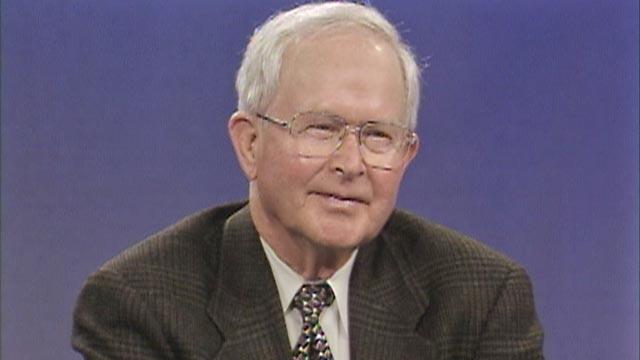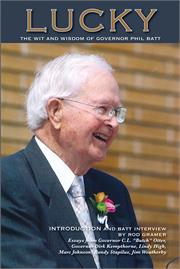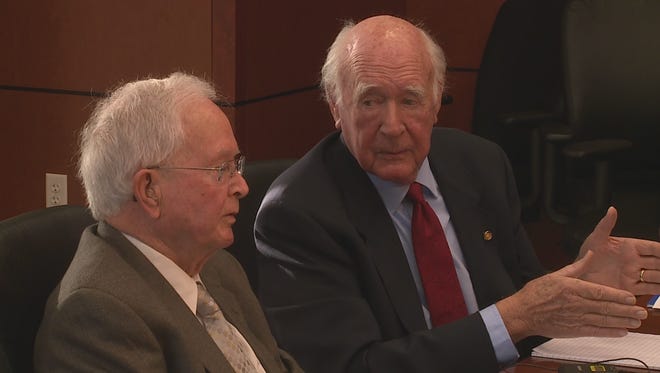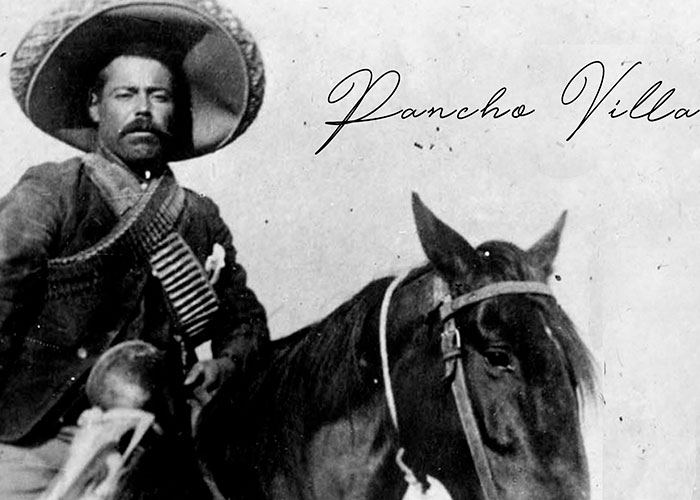Given the current dominance of the Republican Party in Idaho it is difficult to remember it wasn’t always so.
When Wilder, Idaho onion farmer Phil Batt was elected in 1994 as Idaho’s 29th governor he became the first Republican governor in 24 years. Batt defeated a popular incumbent attorney general, and the man some – including his political adversaries – call “the little giant” deserves the lion’s share of the credit for rebuilding a party that had fallen on hard times in the early 1990’s. It was a sea change moment.
A new book just out celebrates Batt’s life and legacy. The little volume is a timely reminder of a better, more civil, more accomplished time in the state’s politics. Without meaning to do so the book also casts light on how reactionary and radical the state’s dominant political party has become in the last quarter century.

(The book – Lucky: The Wit and Wisdom of Phil Batt – has been published by Caxton Press, the venerable Idaho publisher based in Caldwell. All sale proceeds will benefit the Wassmuth Center for Human Rights.)
The book’s author, Rod Gramer, a long-time Idaho journalist who now heads Idaho Business for Education, a group trying to push the state’s education system into the 21st Century, conducted a series of interviews with Batt and also commissioned several essays about the man who broke the string of six consecutive Democratic gubernatorial wins.

I’m honored that Rod asked me to write one of the essays about Batt, a man I’ve known and observed in a variety of roles since 1975. Former governors Butch Otter and Dirk Kempthorne also contributed, as did former Batt staffer Lindy High, journalist Randy Stapilus and long-time political analyst Dr. Jim Weatherby. The book is a fine contribution to Idaho political history.
Several things distinguish Batt – now 94, a bit frail, but as sharp as ever – particularly when his life and career is considered side-by-side with what passes for Idaho conservatism these days. His legacy really comes down to two big ideas: advancing human rights and resisting an often unaccountable federal bureaucracy.
In the first instance Batt was – and remains – the state’s foremost advocate for the Human Rights Commission. He championed the creation of the state agency, helped nurture it in its infancy and supports expanding its authority. Batt told Gramer that he supports, without conditions, the long-delayed adoption of human rights protections related to sexual orientation. “They should not be discriminated against,” Batt said in usual terse, authoritative style.
This position is, of course, at odds with the vast majority of Republicans in the state legislature who have refused with blind determination to even discuss the issue of human rights protections for LGBTQ citizens.
Batt, the conservative farmer, also insisted on providing worker compensation insurance coverage for farm workers. “Why should a farmworker have to put up with injurious practices when nobody else had to do it,” he asks.
Batt came by his human rights views in the old-fashioned way: he observed the Jim Crow South up close while in the military in Mississippi. “I saw Blacks forced off the sidewalk to let Whites go by,” he told Gramer. “Separate toilets. Separate drinking fountains. Blacks forced to the back of the bus. Just totally unacceptable, but most of the people didn’t think it was. I thought it was totally unfair. I didn’t like it. It did make an impression on me.”
The other major piece of Batt’s legacy is the agreement he forced the U.S. Department of Energy to accept that gave Idaho legal leverage over nuclear waste clean-up and further waste storage at the Idaho National Laboratory in eastern Idaho. No other state has such a comprehensive, binding agreement that protects the ground water, health and livelihood of Idaho. Tellingly, Republicans in the congressional delegation and the legislature have been trying to undo the deal every day since Batt signed the agreement in 1995 with the support and encouragement of his friend and occasional political adversary former Democratic Governor Cecil Andrus.

Batt is clearly in the last lap of his long and productive life, and he is correctly predicting that his nuclear waste handiwork will be further eroded when he takes leave. Idahoans will rue the day that happens. Given the arrogance and ignorance of the current ruling class, count on the fact that after the final tributes have been paid to the former governor they’ll do what they can to destroy the best protection Idaho ever had from the overreaching hand of the federal government.
There is much else to be said about Phil Batt. He can tell and take a joke. He is a farmer who plays a mean jazz clarinet and plays it well enough to have jammed with legendary pianist Gene Harris and guitarist Chet Atkins. He can write – speeches and newspaper columns and humorous essays. He was, as Andrus often said, as honest as the day is long, a man of his word, a giant.
The two former governors enjoyed a mutual admiration society. As different in their politics as they were in their physical appearance, Batt and Andrus were totally alike in understanding that when practiced by honorable, candid, decent people politics is the way we get things done in our world. You work things out. You make a deal. You compromise. You understand what the other guy needs and find a way forward.
So much of the modern Republican Party has slipped from the political moorings of a conservative like Phil Batt as to make one wonder if the guy who served in both houses of the legislature, became the leader of the state senate, then lieutenant governor, party chairman and finally governor could win a Republican primary today. He might be too pragmatic, too committed to the process of politics and problem solving to navigate in the land of conspiracy, misinformation and anger that now passes for conservatism.
“The current political climate is a shameful thing,” Batt told Gramer. “I don’t have an answer for it, but it has badly damaged our country worldwide and can get a lot worse.”
He’s right, of course, and if Idaho wants a model for how to rescue the state’s politics from the white supremacy, nationalism and fact-free grievance that now consumes the majority party they could do no better than to look to the life and legacy of the committed conservative from Wilder, Idaho.
—–O—–
Additional Reading:
A couple of other items worthy of your time…
Trump’s place in history? He is the supreme American demagogue…
A piece from the Los Angeles Times on The Former Guy’s place in history.
“Trump is not going away. The Republican leaders who have disregarded the truth to enable him should know what future historians are going to say about the former president — and them, by association. He will be showcased for decades to come as the greatest symbol of American demagoguery of all times. Compared with Trump, demagogues like Huey Long and Joseph McCarthy will become footnotes.”
PANCHO VILLA, THE BATTLE AT THE RIO GRANDE, AND WHY THE REVOLUTION NEEDED A MOVIE STAR

How the Mexican revolutionary turned to the movies.
“Convinced he could follow and defeat the federals at will, Villa paused in Chihuahua City to act as self-appointed state governor. He issued a decree that all hacendados in the state would have their lands confiscated; profits from their operation would now engorge the public treasury, providing Villa with a steady source of money to pay his soldados. After Huerta was defeated, the land would be divided up among all the people of Chihuahua.”
Thanks for hanging around here. All the best.


